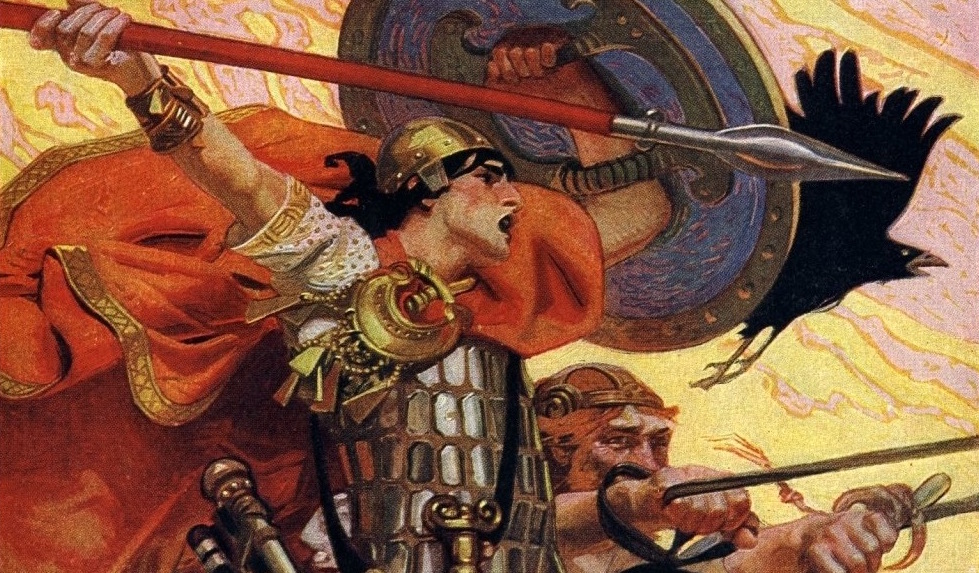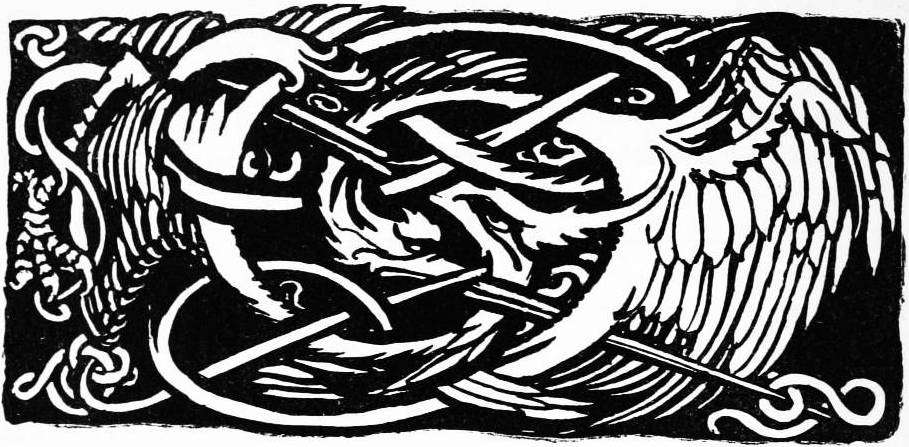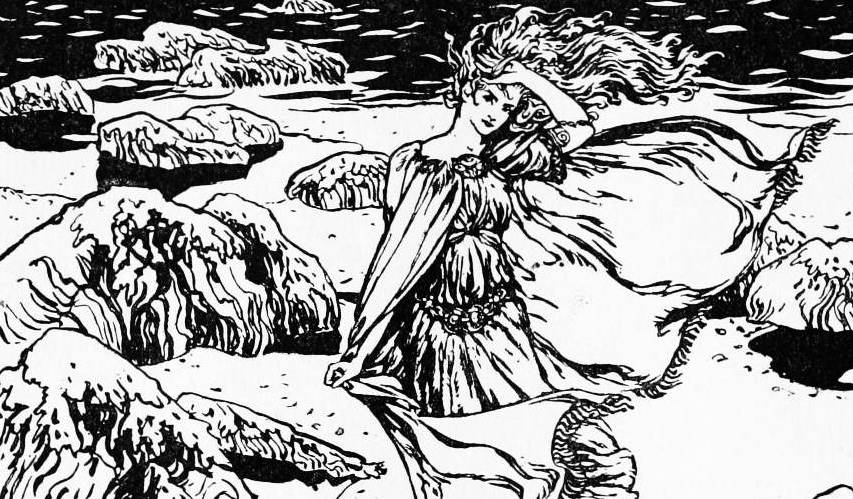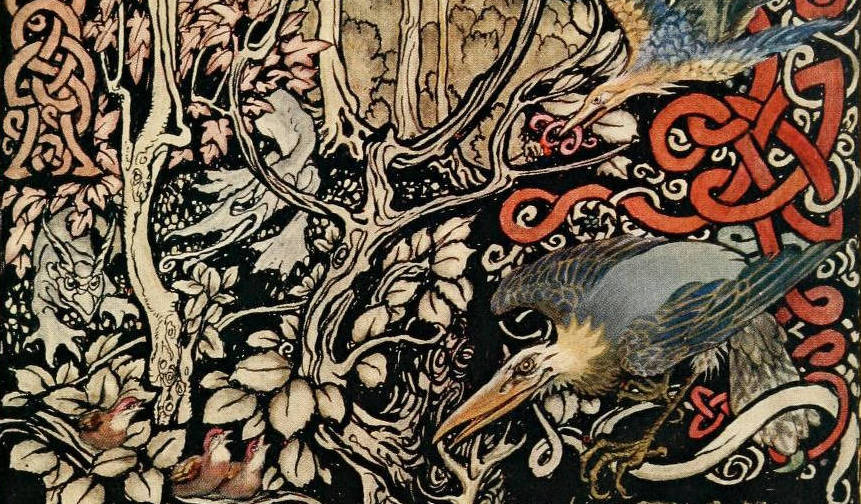Almost all human cultures have general taboos, and many also have personal taboos. For example, if your personal taboo is the bird, killing birds is likely forbidden to you, but not to your neighbor. We can use this to make awesome adventures! To explore the idea, let’s look at an early medieval Irish epic about taboos: The Destruction of Dá Derga’s Feast Hall.
This post is brought to you by beloved Patreon backer Colin Wixted. Thanks for helping keep the lights on! If you want to help keep this blog going alongside Colin, head over to the Patreon page – and thank you!

The hero of the epic is Conaire Mór, a mythical High King of Ireland. He was fostered by the old king, Conaire’s mother’s husband, but Conaire’s biological father was one of the so-called Good People who live beneath the faerie mounds. The elf arranged for his young son to become the next High King. But when the youth was crowned, he received seven taboos (geas, plural geasa):
1. Do not settle any quarrel between two of your vassals.
2. Spend at least every ninth night at Tara, the ancient seat of the High Kings.
3. Do not go clockwise around Tara or counterclockwise around Dublin.
4. Do not hunt the evil beasts of Cerna.
5. No pillaging shall be wrought in your kingdom.
6. Three Reds shall not go before you to Red’s house.
7. After sunset, no man or woman traveling alone shall enter the house you are in.
Conaire’s reign was long, happy, and prosperous. Times were good! Until two of Conaire’s vassals, both of them chiefs, fought a battle. Geas number one forbade Conaire from resolving their dispute, but what kind of king would he be if he stood aside? So he negotiated a peace and stayed five nights with each of them, thereby also violating taboo number two. Conaire’s route home broke geas three. And on the way, he hunted monsters that, once slain, were revealed to be the evil beasts of Cerna, breaking taboo four.
Ill consequences swiftly followed. For breaking his geasa, Conaire’s kingdom was now ravaged by war. The worst of the plagues to now befall Ireland was Ingcél, an Englishman and king of 5,000 reavers in 150 ships. Ingcél was a terror to behold. He was a giant with a single eye the size of an oxhide, and with seven pupils therein. Ingcél and his raiders roamed all across Ireland, plundering and burning as they went.
Of course, all this raiding was itself a violation of Conaire’s taboo number five. The powers that be were punishing Conaire for violating his geasa by inflicting more violations upon him, which themselves must then be punished!

When Conaire was out trying to deal with the terrors befalling Ireland, he found taboo number three (which restricted his routes) forced him to take a particularly perilous road. Fortunately, he had a vassal along this road who owed him a favor. The vassal would surely provide Conaire and his companions a place to spend the night. This man’s name was Dá Derga, which means ‘Red God’. He had a great feasting hall and was famous for his hospitality. Since the day he built his hall, its cauldron had never once left the fire, nor had any door ever been closed, save on the side to which the wind comes.
But on the road ahead, also riding for the feast hall, were three horsemen dressed all in red. They rode red steeds, carried red spears, and sported red hair. If the red horsemen beat Conaire to the hall of Dá Derga, the ‘Red God’, it would violate taboo number six! Conaire sent a lad to ride after them and ask them to stop. But stop they would not! Instead, they revealed they were elves, of the Good People from beneath the barrow mounds. They had lied to their own king, so he punished them by ordering them to ride to Dá Derga’s feast hall where there would be a fight and they might perish. He also ordered them to beat Conaire to the hall so their punishment would punish him too.
It was not the first time elves had pulled such a stunt. When Conaire inadvertently hunted the evil beasts of Cerna, it was elfin magic that hid the beasts’ identities from him. And though Conaire rode as hard as he could, the faerie steeds ran all the faster and caused him to break geas number six.
Now Conaire had broken all the taboos of his kingship, save one: that after sunset, no man or woman traveling alone should enter the house he was in. And this geas, number seven, was not long for this world. After Dá Derga welcomed Conaire and his companions and showed them every hospitality, a sorceress named Cailb arrived at the hall. Conaire offered her an ox and a pig if she would seek hospitality elsewhere, but she rebuked him. “If it has befallen the king not to have room in his house for the room and bed of a solitary woman, I will get them elsewhere, from someone who actually possesses the kingly virtue of generosity.” Ashamed, Conaire admitted the sorceress, and there went the last of his geasa.

Conaire would go on to have the worst night of his life. Ingcél, the king of the English raiders, landed near Dá Derga’s hall with his 5,000 reavers and 150 ships. He saw the feasting within and swore he’d sack the place. With his magic eye, Ingcél scouted the hall and saw Conaire’s companions: Irishmen, Picts, conjurers, the crown princes of the three kingdoms of England, elves, centaurs, Fomorians, Manx ogres, the ill-omened ghosts of hanged women, and even a giant! Every man there was a legendary warrior famed in song and story, and King Conaire was the greatest of them all. The raiders wanted no part of this. But Ingcél had sworn, so, reluctantly, they attacked.
The outcome was… bizarre. King Conaire’s mythical companions sallied forth one at a time. Each killed scores of raiders, was wounded, and escaped the battlefield. By the end, Conaire was alone and almost all the reavers were dead. Then Conaire abruptly died of thirst. Ingcél cut off Conaire’s head and hightailed it out of there.
There is one final detail. Before Ingcél and his raiders approached Dá Derga’s feast hall, they built a cairn, to which each man added a single stone. The idea was that after the raid, each man would remove a stone, and so by counting the stones left behind, the raiders would know their losses. The epic claims the cairn still stood when it was composed. Its size was a tangible reminder of the violence at Dá Derga’s hall – and of the importance of following one’s taboos.

So what conclusions can we draw? First, taboos can drive adventure. Fear of violating his geasa drove Conaire to take the perilous road to Dá Derga’s house and try to overtake the red riders. Second, taboos can create conflicts that are difficult (and interesting) to resolve. The first taboo Conaire violated was settling a quarrel among his vassals. But not doing so would have made him a bad king. Ditto admitting the sorceress to Dá Derga’s hall. Some players (like me!) really enjoy trying to find the best solution to these no-win conundrums. And finally, if the consequence of violating a geas is violence, that’s great, because that is itself an adventure!
If you give some of your PCs taboos, be sure they’re about things both you and they find interesting. It’s probably going to come up a lot; make sure it’s something you and they will enjoy when it does. Alternatively, you might consider giving the group as a whole a taboo or two. That way, everyone gets to share in the difficulties and triumphs. The source of the geas also matters. Make it personal! A taboo might come from a totem animal, a supernatural patron, or a demigod who’s taken an interest in the party. The nature of a taboo might be arbitrary, but its source should always feel meaningful.






